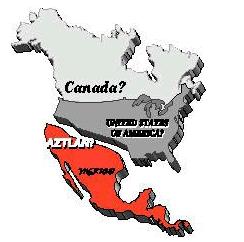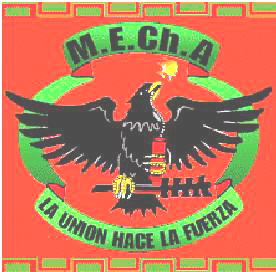The myth of Aztlan can best be explained by California's Santa Barbara School District's Chicano Studies textbook, "The Mexican American Heritage" by East Los Angeles high school teacher Carlos Jimenez. On page 84 there is a redrawn map of Mexico and the United States, showing Mexico with a full one-third more territory, all of it taken back from the United States. On page 107, it says "Latinos are now realizing that the power to control Aztlan may once again be in their hands."
Shown are the "repatriated" eight or nine states including Colorado, California, Arizona, Texas, Utah, New Mexico, Oregon and parts of Washington. According to the school text, Mexico is supposed to regain these territories as they rightly belong to the "mythical" homeland of Aztlan. On page 86, it says "...a free-trade agreement...promises...if Mexico is to allow the U.S. to invest in Mexico...then Mexico should...be allowed to freely export...Mexican labor. Obviously this would mean a re-evaluation of the border between the two countries as we know it today." Jimenez's Aztlan myth is further amplified at MEChA club meetings held at Santa Barbara Public Schools..
The book, paid for by American tax payers, cites no references or footnotes, leaving school children totally dependent on their teacher to separate fact from opinion and political propaganda. The book teaches separatism, victimization, nationalism, completely lacks patriotism towards the United States, and promotes an open border policy. The book is 100 percent editorial -- the opinions of the author.
WHAT IS AZTLAN?

WHAT IS RAZA
"La Raza" (The Race) is a broad term which refers to those whose ancestry is indigenous to the area of Mexico (or "Aztlan"). MEChA members refer to themselves as "La Raza" or "Raza," but the term itself is used to indicate camaraderie among those in different organizations with the same objectives. There are a number of organizations who consider themselves to be La Raza.
The most visible of these groups are MEChA, The Brown Berets de Aztlan, OLA (Organization for the Liberation of Aztlan), La Raza Unida Party, and the "Nation of Aztlan" to name a few. Although the activism of these organizations vary from somewhat radical to extremely radical, they share the same objectives, the "liberation of Aztlan." Each follows the Raza manifesto "El Plan de Aztlan (sometimes called "El Plan Espiritual de Aztlan"). The Nation of Aztlan, tied to La Voz de Aztlan disseminates the exact same propaganda that MEChA spreads including antisemitic propaganda. Believers in the Aztlan legend insist upon the indivisibility of "La Raza" and their common goals, one of them being the need to abolish the border between the U.S. and Mexico. There is a myriad of Raza college newspaper. Some are El Popo, Aztlan News, Chispas, Gente de Aztlan (UCLA), Voz Fronteriza (U.C. San Diego), La Voz Mestiza (U.C. Irvine) and La Voz Berkeley. It is not uncommon for the writers of these publications to refer to the U.S., as "AmeriKKKa."
Rhetoric by some Chicano educators strongly suggest Communist or Socialist leanings. In May, 2000, more than 1,200 students gathered at UCLA for the seventh annual Raza Youth Conference, which the members say promotes higher education and recognition of the Aztlan culture. Sponsored by MEChA, the year's theme was "Reclaiming Our Razas through education, resistance, and promoting the idea of remembering the historical struggles of Raza" said Erika Ramirez, co-chair of the conference. The conference drew students from 80 middle and high schools and community colleges; featured speeches by those actively involved with the Chicano community.
The keynote speaker was Antonia Darder, a professor of education and cultural studies at Claremont Graduate University and director of the Institute for Cultural Studies in Education, who received a standing ovation for her speech.
Darder described American capitalism and what she said were its impacts on racism and sexism. "I grew up in a capitalist society, a society that taught us that the greed of corporations control politics," Darder said. "Capitalism is the root of domination. Racism and sexism exist because capitalism requires it." Darder said a globalized economy forced smaller countries to give up their self-sufficiency, resulting in people migrating to the U.S. "We're here because U.S. foreign policy in Latin America has forced us here," she said.
The University of Oregon Chapter of MEChA hints at its communist sentiments by posting a picture of Cuba's communist dictator Fidel Castro. On its web site, "La Voz de Aztlan" has an excerpt from a speech of February 7, 1997, by Fidel Castro who said "the United States should return to Mexico huge chunks of that country's territories it acquired more than a century ago" La Voz de Aztlan, whom Antonio Villaraigosa refuses to repudiate, also disseminates antisemitic propaganda,
Apparently, these "Raza" cults are composed of people who unabashedly hate the United States and often support other groups and leaders who also hate America. Raza's hatred of America is so intense, that most make bedfellows to anyone else who also hates America, like dictator Fidel Castro; murderer of his own people Sadam Hussain; and the women hating Taliban -- and of course they sympathize with all Islamic Terrorists over the Israel/Palestine issue. Raza cults are the loudest and most insistent element of the immigration lobby in California. Inebriated with a sense of righteous victimhood, and entranced by myths of a heroic racial past, devotees of the Aztlan cults are rapidly extending their influence within California's Hispanic population, particularly among students in the university system.
The official national symbol of MEChA is an eagle holding a machete-like weapon and a stick of dynamite.
WHAT IS MEChA

The acronym MEChA stands for "Movimiento Estudiantil Chicano de Aztlan." or "Chicano Student Movement of Aztlan."
MEChA is an Hispanic separatist organization that encourages anti-American activities and civil disobedience. The radical members of MEChA who refer to themselves as "Mechistas," romanticize Mexican claims to the "lost Territories" of the Southwestern United States -- a Chicano country called Aztlan. In its national constitution, MEChA calls for self-determination by its members to liberate Aztlan. MEChA's national constitution starts out: "Chicano and Chicana students of Aztlán must take upon themselves the responsibilities to promote Chicanismo within the community, politicizing our Raza with an emphasis on indigenous consciousness to continue the struggle for the self-determination of the Chicano people for the purpose of liberating Aztlán."
These anti-American "Mechistas" live with the false illusion that they are being racially discriminated against because they are Latinos while totally dismissing the idea that maybe it is their ideology that is being discriminated against.
At the MEChA National Conference on March 15 - 18, 2001, the official "MEChA Philosophy" was ratified. An excerpt from the document states: "as Mechistas, we vow to work for the liberation of Aztlan."
The MEChA Clubs on each of the Santa Barbara high school campuses are not the only ones. MEChA groups exist on 90 percent of the public high school, college and university campuses in the Southwestern United States.